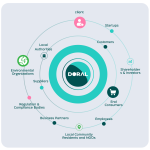-
- Developing and generating for our planet
- Doral’s Contribution to Reducing Emissions and Addressing for Climate Change
-
Innovation
Full chapter- Innovation
- A Leader in Israel’s Energy Storage Sector
- Doral Tech – Energy of Innovation
- A Bridge to Academia and Future Technologies
- Leading the Field of Dual-Use Renewable Energy Production in Israel
- Development of ‘Green Hydrogen’ Projects
- Development and Management of Environmental Infrastructure Integrated with Renewable Energy
- At the Forefront of Israel’s Green Electricity Market
- Reducing Water Consumption
- Preserving Biodiversity
- Waste Treatment and Promotion of Circular Economy
- Our Overall Environmental Impact – Greenhouse Gas Emissions Data
- Progress Against Targets
-
-
- Responsible and Ethical Management of Our Business
-
Corporate Management at Doral
Full chapter - Corporate Governance for ESG
- Business Ethics and Compliance at Doral
- Preventing Bribery, Corruption, and Conducting Internal Audits
- Information Security and Business Continuity
- Risk Management
- Responsibility in Our Value Chain
- Progress Against Our Targets
-

Dialogue with Doral’s Stakeholders
Doral’s stakeholders are a central part of the Company’s work model, and ongoing, open dialogue with them ensures our success and growth. Doral has mapped out its relevant stakeholders based on a systematic methodology, taking various measures to balance and meet different stakeholders’ interests and needs through transparent and inclusive communication.
Doral involves its key stakeholders in relevant decision-making processes and responds to specific needs that are brought to our attention. Doral views its stakeholders as vital allies, and works to ensure that these relationships yield shared economic and social value for all partners.

Employees, Business Partners, Suppliers, Local Authorities, Environmental Organizations, Local Community Residents and NGOs, Shareholders and Investors, End Consumers, Regulation and Compliance Bodies, Customers, Startups
At Doral, we maintain regular and meaningful engagement with our primary stakeholders, including energy generation partners, employees, suppliers, customers, regulators, and government authorities. These key stakeholders play a crucial role in driving the success of our Company.
Partners in clean energy generation – Our work model is based on partnerships with local landowners, encompassing a diverse range of applications such as rooftops, fields, agricultural areas, reservoirs, and fences. These collaborations bring about shared value, benefiting both parties involved. We prioritize transparency, integrity, and cooperation throughout the entire process, from project conception to operation. In Israel, our operations typically involve partnerships with kibbutzim and moshavim, where we develop the facilities. Globally, our partners are landowners, leaseholders, and local entrepreneurs. To read more about our relationships with partners, refer to the “Investment in the Periphery – Socioeconomic Development” and “Investment in the Community” chapters.
Employees – The Company’s employees are our biggest asset, and we do our best to provide them with an optimal work environment that encourages their growth and development. We maintain a regular, open dialogue with them through formal and informal channels. For more on employee development and retention, refer to the “Energy of People” chapter.
Suppliers – The Company’s suppliers are divided into three main categories: essential equipment suppliers (panels, inverters, storage systems, infrastructure setup, and more) , project contractors, consultants with whom Doral engages on a variety of topics. Our project managers are in regular contact with project contractors and conduct regular visits to the facilities throughout the construction process. For more on the Company’s suppliers, refer to the “Our Responsible Value Chain” chapter.
Customers – Currently, Doral operates with a strategy of working exclusively with large commercial customers, focusing on a relatively small number of significant clients. Given Doral’s nature of operation and high demand for the green electricity we produce. Our main clients include the Israel Electric Corporation (with kibbutzism as our partners), business customers who engage with us in agreements for purchasing electricity and “green certificates” such as ICL, Melisron, Migdal Insurance, and other clients, as well as companies that engage with us in power purchase agreements (PPAs) within our global operations, including energy corporations AEP and Constellation (leading utilities in the U.S.) and other variable customers purchasing electricity in the free market. Due to the nature of these clients and our relationships with them, interactions with senior managers at Doral are personal, direct, and frequent. Directly managing relationships with large, leading clients allows us to maintain thorough documentation on the nature of our relationship with them in our internal system, without requiring the use of a dedicated customer management platform. This approach ensures information protection and privacy in the ongoing management of our relationship with them. We remain open to dialogue, questions, and continuous feedback from clients with the goal of consistent improvement achieved by gleaning insights, enabling us to collaboratively improve our offerings and solutions.
Regulators, Government, and Local Authorities – The relevant government authorities for Doral’s activities include the following governmental departments and regulatory bodies in Israel: the Ministry of Energy, the Electricity Authority, the Securities Authority, the Tax Authority, the Lands Authority, the Nature and Parks Authority, the Ministry of Environmental Protection, the Planning Administration, the Ministry of Agriculture, the Ministry of Health, the Water Authority, the Antiquities Authority, and the Drainage Authorities. The Company complies with the requirements of the regulators and governmental bodies and adheres to transparency and openness with all parties.
-
Stakeholder Group
Employees
-
Dialogue Channels
• Meetings
• One-on-one conversations
• Interviews with the Company CEO, Deputy CEO, and Chairman
• Company-level discussions
• Company gathering and team building days
• Company WhatsApp group
• Anonymous suggestions box
• Meetings between various departments and the CEO
• Direct connection to the HR manager
• Meetings at the Israeli Business Development Forum, European Forum, United States Forum, Doral Tech Forum, Hydrogen Forum, ESG Forum, Safety Forum, and departmental forums
• Employee participation in conferences and exhibitions
• Employee visits to company sites in Israel and abroad -
Main Topics
• Employee engagement and involvement
• Diversity and Inclusion
• Labor relations
• Learning and development
• Occupational hygiene, health, and safety
• Personal development and professional enrichment
• Business development
• Volunteering in the community
-
Stakeholder Group
Business Partners in Israel
-
Dialogue Channels
• Regular contact with the kibbutzim and moshavim administrations (including through the Doral Partnerships and Partnership Relations Managers)
• Kibbutz meetings
• Annual meetings
• Roundtable discussions with large suppliers such as EPC and O&M companies
• Initiating and establishing partnerships to develop and industrialize other innovative clean energy sources
• Advertising and accessibility of various media channels
• Ongoing dialogue with startups
• Ongoing professional dialogue with academia
• Business partnerships with contractors
• Strategic partnerships with companies in relevant industries -
Main Topics
• Shared value and economic independence
• Proper utilization of land resources
• Motivation and control over the entire value chain
• Improving, optimizing, and enhancing performance
• Improving energy efficiency
• Hosting pilots at Company sites and investing in selected companies
• Financing joint applied research with leading universities
• Accelerator and growth programs for startups in the energy and climate sectorsthe energy and climate sectors
-
Stakeholder Group
International Business Partners
-
Dialogue Channels
• Work and management meetings
• Landowners - public engagement and initiation of development processes
• Joint investments in the development of advanced technologies and premium products in the fields of clean energy and climate, with top-tier global investment partners (corporations and financial funds)
• Participation and leadership in professional working groups on core issues with investment partners and global corporations
• Business partnerships with contracting companies -
Main Topics
• Shared value
• Utilization of land resources and other natural resources such as sun, wind, minerals, and organic waste
• Improving, optimizing, and enhancing execution processes
• Improving energy efficiency
• Leading the development of additional innovative green energy sources
• Accelerator program for Israeli and European growth-stage startups
• Motivation and control over the entire value chain
-
Stakeholder Group
Suppliers
-
Dialogue Channels
• Contractual engagements
• Site visits and inspections
• Roundtable discussions with major suppliers such as EPC and O&M companies
• Focused work discussions
• Advertising and accessibility through various media channels -
Main Topics
•• Safety
• Labor rights
• Business ethics and anti-corruption
• Partnership-based approach
• Inclusion and diversity
• Improving, optimizing, and enhancing execution processes
-
Stakeholder Group
Regulators and Government Entities
-
Dialogue Channels
• Ongoing dialogue with regulators and authorities, led by the Company’s Regulatory Affairs Manager and senior managers
• Completion of environmental surveys and plans
• Ad hoc reports to regulators
• Submitting comments and notes on regulators’ “public hearings” and “calls for proposals”
• Intensive work with planning and building committees
• Participation and lectures at study and seminar days organized by various entities, alongside regulatory representatives -
Main Topics
• Compliance with regulatory requirements
• Reducing environmental impact
• Improving, optimizing, and enhancing execution processes
• Energy efficiency innovation
• Innovations in dual-use of land units (rooftops, reservoirs, agricultural areas, fences)
-
Stakeholder Group
Shareholders, Investors, and Financing Entities
-
Dialogue Channels
• Reporting through the MAGNA system
• One-on-one conversations/investor conferences
• Tours of various Doral sites
• Investor relations website
• Publications on various media channels -
Main Topics
• Economic performance
• Corporate governance
• Business ethics and anti-corruption
• Work plans and strategic development
• Disclosure and transparency
-
Stakeholder Group
Communities, Local Authorities, Residents, and NGOs
-
Dialogue Channels
• Structured public participation processes
• Participation in conferences and events
• Meetings with community partners ongoing relationships to foster cooperation with regional councils near production sites
• Collaboration on local social enterprises
• Local meetings and gatherings
• Participation in regional community sports and cultural activities -
Main Topics
• Local economic development
• Promoting the welfare of local communities
• Reducing environmental impact
• Financial contributions and community sponsorships
-
Stakeholder Group
Environmental Organizations
-
Dialogue Channels
• Open channels for inquiries
• Filing objections
• Structured dialogue around site construction
• Participation and lectures at study and seminar days organized by various entities, alongside regulatory representatives -
Main Topics
• Reducing environmental impact and preserving open spaces
• Mitigating climate change impacts
• Waste and organic waste treatment - biogas and waste-to-energy
• Dual-use of land units (rooftops, reservoirs, agricultural areas, fences)
• Land rehabilitation
-
Stakeholder Group
Business Customers
-
Dialogue Channels
• Direct and close communication with the operations manager and employees of the Israel Electric Corporation Portal for monitoring electricity consumption
-
Main Topics
• Green electricity consumption in 2024
-
Stakeholder Group
Startups
-
Dialogue Channels
• Direct and close communication with the relevant managers at Doral Tech
-
Main Topics
• Activities of startup companies and investment evaluation
• Collaborations to promote innovation, solutions, and positive environmental impact